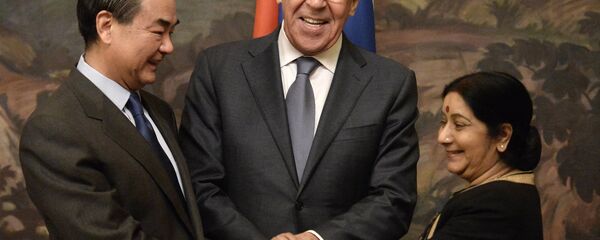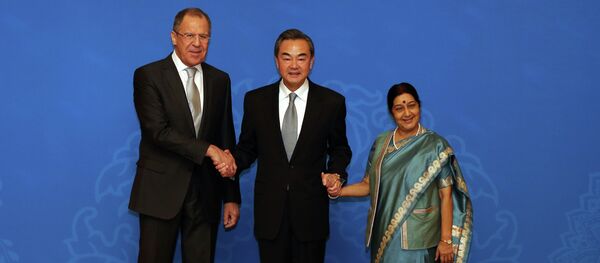Closer policy coordination at the ministerial-level in Russia, India, and China grouping, or the RIC forum can provide solutions to a number of problems currently being experienced by these three countries, a former Indian diplomat Ashok Sajjanhar has said.
Sputnik: Why the RIC so infrequent in its meetings. It has had two or a maximum of three meetings in the last twelve years. Should it not be playing a more effective role globally?
Ashok Sajjanhar: RIC is more of a platform to discuss. It is not a forum like SCO (Shanghai Cooperation Organisation), which has its own secretariat. It is not like the BRICS also. There is a rationale for these three countries to come together, as it allows them to take both political and economic decisions that are useful and beneficial. In that sense, it is a loose and informal structure that provides a comfort level for the different countries to raise any issue that they may wish to discuss. In the normal scheme of things, the RIC might not come out with even a joint declaration like other forums such as BRICS and G 20, which also have their own secretariats.
Ashok Sajjanhar: Yes, I think these are issues that can and should continue to be discussed. I am sure the three leaders will not formally use the SCO summit to be held in the second week of June to discuss their views on these global developments. But they could probably have informal exchanges on the sidelines. Two of the three issues listed above are of immediate concern. Iran, as you know, is an observer at the SCO. As far as the US-China trade war is concerned, we all know that China is one of the driving forces of the SCO; so that will be discussed in the formal meeting as well as the informal bilateral meetings. We must also keep in mind that India is a member or party to many of these multilateral formats, so its views will be heard. Coming to RIC, it had a meeting in New Delhi in December 2017, the second meeting in Buenos Aires in November 2018 and a third in Zhejiang. So, these discussions are taking place more frequently now than before.
READ MORE: Experts Say Russian Game Plan in Eurasia Could Bring India, China Closer
Sputnik: Does RIC as a grouping have a significant role to play in Afghanistan's immediate and future development?
Ashok Sajjanhar: No, not really. Not formally in any way. In that sense, you can say that even the SCO which has an Afghan Contact Group; so far I have not been able to see whether they have done anything.
Ashok Sajjanhar: RIC as a forum is extremely important, though engagement is limited only to three countries i.e. Russia, India and China. These are Asian countries, neighbouring countries.
Though their exchanges are not at the summit-level, but at the foreign ministerial level, they have an impact or trilateral and bilateral relations. So at the operational level, they are able to get together and see what the problems are; try to discuss them and then take decisions that are forward-looking.
All three countries are very close and have their own distinct and specific benefits and advantages, and influences. Central Asia is part of our extended neighbourhood and we have no other fora where we can reach out at the highest level on a regular and frequent basis to discuss political, strategic, security, economic, trade, investment and energy issues. It is a very important forum.
The views and opinions expressed in this article are those of the speaker and do not necessarily reflect Sputnik's position.





